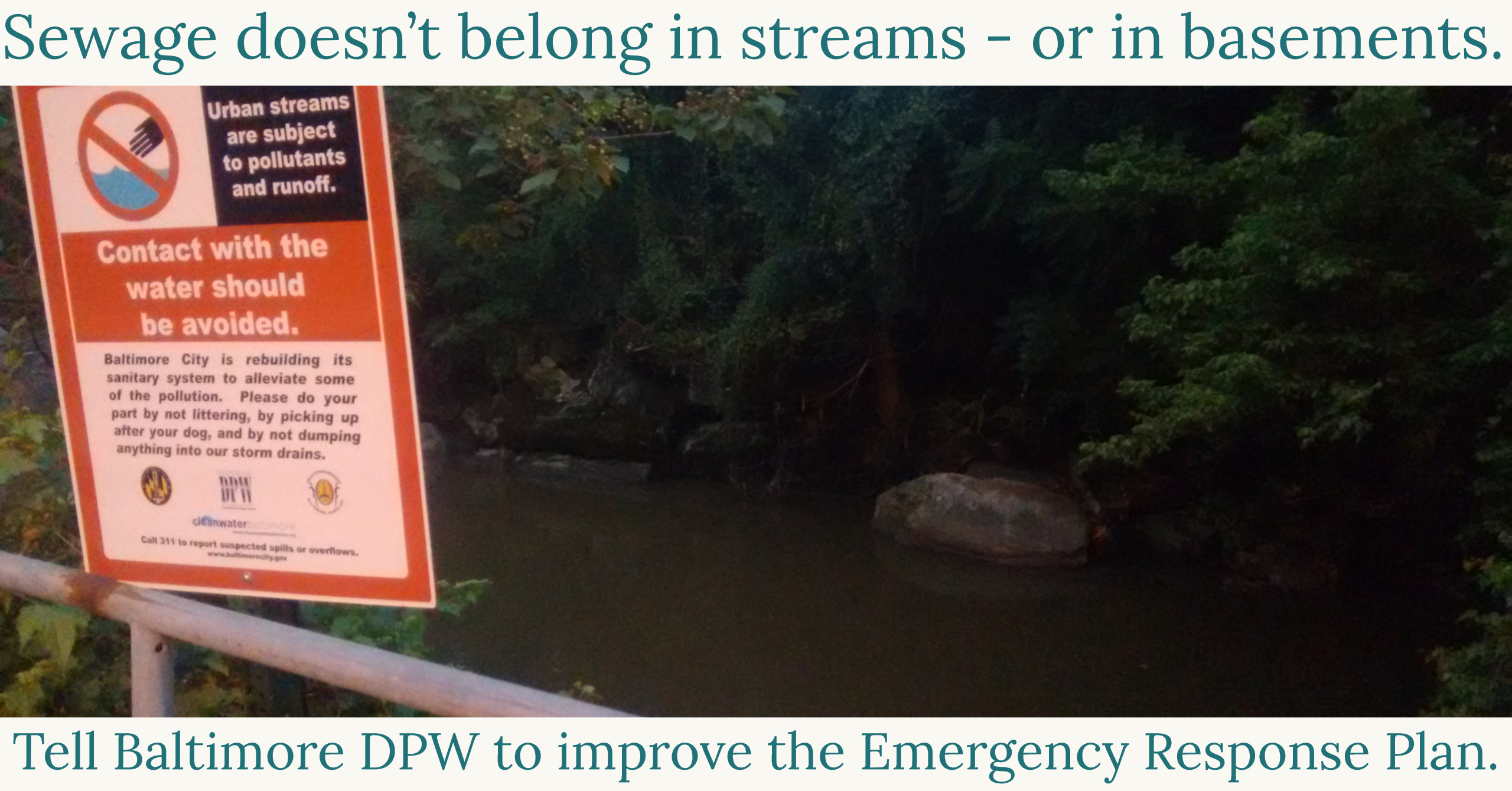
Two years ago, as Baltimore City renegotiated its agreement with the EPA to repair faults and design flaws in its sewage system, residents spoke out and organized because their neighborhoods had a chronic sewage problem: at times the system designed to collect and pipe sewage to treatment plants would fail, causing raw sewage to overflow into their homes. As a result of these protests and comments submitted by advocacy groups, the final consent decree was revised to include requirements that Baltimore develop programs for basement backups caused by problems in city-owned infrastructure. Under this requirement, Baltimore's draft Emergency Response Plan, released last month, included provisions for dealing with basement back-ups of sewage as well as overflows into streets and streams. Read it here.
Although the programs outlined in the Plan are an improvement, there are some key ways that they fall short. We worked with the Environmental Integrity Project and residents of Northwest Baltimore neighborhoods impacted by basement back-ups to point out key ways that these programs should be improved to better serve Baltimore residents, including:
- The Plan does not require that the City or its contractors assist residents with cleanup after a sewage backup. Other areas of the country with similar challenges, like Hamilton County, Ohio - the county that includes Cincinnati - provide clean-up crews to city residents who have a basement back-up in their home. This is important because contact with raw sewage poses severe risks to human health. The EPA has stated that raw sewage "often contains a variety of microorganisms, viruses, bacteria and intestinal parasites that can cause serious illnesses, including cholera, dysentery, hepatitis cryptosporidiosis and giardiasis." If someone cannot afford a contractor and tries to clean up a basement back-up themselves, they are at risk of severe health impacts. We are urging the City to create a program to directly help residents clean up basement back-ups.
- The Plan creates, for the first time, an Expedited Reimbursement Program that requires the City to make a decision about reimbursement requests for the cost of cleaning up a back-up that was caused by the city system within 60 days. (Back-ups originating on private property are not eligible for the program.) However, not all back-ups caused by the city system are eligible. Residents cannot receive compensation under this program if the back-up is caused by city infrastructure failure, instead of the effect of a rain event on the city system, and it seems that residents can't receive compensation for back-ups caused by certain heavy rain events (five- or ten- year storms). We are urging the City to make all back-ups caused by the city-owned system eligible for this program.
- The Expedited Reimbursement Program will only reimburse people for clean-up costs of $2,500 or less, and will not reimburse people at all for property loss. While the City's General Claims process is still available for residents to recoup property damage, this can be a long process, which significantly disadvantages people who cannot afford to pay thousands of dollars upfront in the hopes of recovering it later. (Read this report from EIP for more about the delays involved in the legal claims process.) We are urging the City to raise the cap on reimbursement, at least for people experiencing financial hardship, and allow this program to cover at least some costs of property loss. We are also asking the City to clarify that participating in the expedited program for reimbursement of clean-up costs will not prevent a resident from later filing claims for property loss.
- When a Baltimore City resident finds a sewage back-up in their home, the first thing they should do is call 311. However, the Plan does not require that 311 call staff get training on how to assist people in addressing a basement back-up and navigating the City programs available to help them. These call staff should receive training that allows them to assist affected residents.
- The consent decree requires that Baltimore develop plans to ensure prompt repair or replacement of city-owned lateral sewagae lines when acute or catastrophic failures of those lines cause basement back-ups. The Operations and Management Plan, released last year, stated that plans for prompt remediation of such lateral failures would be included in the Emergency Response Plan - but they are not. This deficiency must be fixed for the city to be compliant with the consent decree.
Download and read our full comments here:


